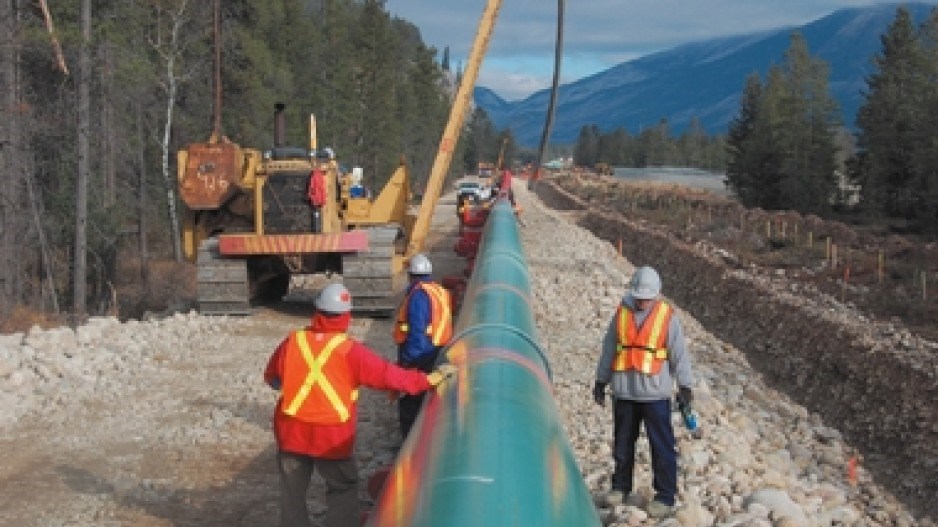Twinning the Trans Mountain pipeline, which Canadians now own, will cost $5 billion more than the last capital cost estimate, Trans Mountain president Ian Anderson confirmed Friday February 7.
The expansion, last pegged in 2017 at $7.4 billion, will actually cost $12.6 billion, Anderson confirmed Friday, February 7. That is $3.3 billion more than what the Parliamentary Budget Office estimated a one-year delay would push the final costs to.
In 2018, the Trudeau government salvaged the project when it agreed to buy it from Kinder Morgan for $4.5 billion. That price included the price for the existing pipeline, plus the $1 billion already spent or committed before the Federal Appeal Court of Canada halted the project.
When the Trudeau government bought the project, twinning it to nearly triple its capacity was estimated to cost $7.4 billion. Last year, the Parliamentary Budget Office estimated a year’s delay could push that price of the expansion to $9.3 billion.
When Kinder Morgan signaled it might scrap the project, the Alberta government under former NDP premier Rachel Notley said it would pony up to $2 billion, should the project face cost overruns.
Whether the Jason Kenney government will honour that commitment for a backstop remains to be seen. He may balk at the idea that British Columbia will get $1 billion in revenue sharing from Trans Mountain.
That’s the commitment the Christy Clark government finagled out of Trans Mountain in exchange for her government’s support of the project.
It was assumed that commitment was off the table after the John Horgan NDP government did 180-degree turn and announced it would use every tool in its toolbox to halt the expansion.
But Anderson revealed for the first time today that B.C. will still get that $1 billion in revenue sharing.
“We have an unprecedented agreement with British Columbia, where we’ll be contributing up to $1 billion to British Columbians so that every corner of the province can have access to funds for environmental initiatives and share in the benefits of the project,” Anderson said.
That might not sit well with Alberta, given it was the Horgan government that was largely to blame for the federal government having to rescue the project by buying it. When it announced it could no longer see the project through, Kinder Morgan cited difficulties between governments – i.e. the federal and B.C. government – as one of the reasons for backing away.
Anderson said the increased capital costs are the result of the starting and stopping the project, additional carrying costs, changed market conditions (the price of steel and labour, for example), and increased scope and design changes. Also, the project now has more benefits agreements with First Nations than it did in 2017, at the time of the last capital cost estimate. It has gone from 43 to 58 agreements, worth close to $500 million.
The project’s expansion was halted for a year, when the Federal Court of Appeal quashed the order in council that approved the project, and the federal government was sent back to the drawing board to address shortcomings in the approval process, including First Nation consultations.
“Time is money, as we all know,” Anderson said. “Market conditions have changed. Circumstances have changed.”
As for design and scope changes, Anderson said the company will use thicker steel pipe than originally proposed, and will install “state-of-the-art” leak detection technology.
“We made the decision that we were going to install what’s called hi-fi technology from Edmonton to Burnaby in the areas that we’re constructing,” Anderson said.” We didn’t have to do that.”
That new technology adds $70 million to the cost of the project. Anderson said increased use of unionized labour has also added to costs.
“Union labour will do 50 per cent of the work undertaking in Burnaby and Westridge and a third of the work along the pipeline corridor,” Anderson said. “That wasn’t the case in 2016, 2017. We made a conscious decision to ensure that we have labour harmony and labour balance across this project.”
All along, the government’s plan was to complete the expansion project and then sell it. A number of First Nations groups have said they want equity in the pipeline.
But the increased capital cost means a return on investment will take longer, which could cause potential buyers to balk at the new price tag. Potential buyers include a number of First Nations groups.
Chief Michael LeBourdais of the Whispering Pines First Nation, which is part of a group of First Nations that are seeking an equity position in the Trans Mountain project, told Business in Vancouver that he would be holding a conference call this morning with lenders and First Nations partners to discuss the implications of the new price tag on their bid for equity.
The increased capital cost also means shippers will have to pay higher tolls.
Anderson said he expects pipeline to be going into the ground in all spreads in B.C. and Alberta before the end of this year. To date, 3,000 people are working on the project, he said.
Anderson said a $500 million contingency has been added to the project’s budget just to deal with further delays that might be caused by protests and other disruptions.
He said the B.C. government is cooperating in the issuing of permits. Anderson said the company now the expanded pipeline will be in service in late 2022.
To date, $2.5 billion has been spent on the expansion. So another $8.4 billion will still need to be spent. Financial carrying costs alone, which includes interest on borrowing, now accounts for $1.7 billion.
Despite the increased costs, Anderson insisted that it will make a return on investment that is “very consistent with similar regulated pipeline projects in our country.”



